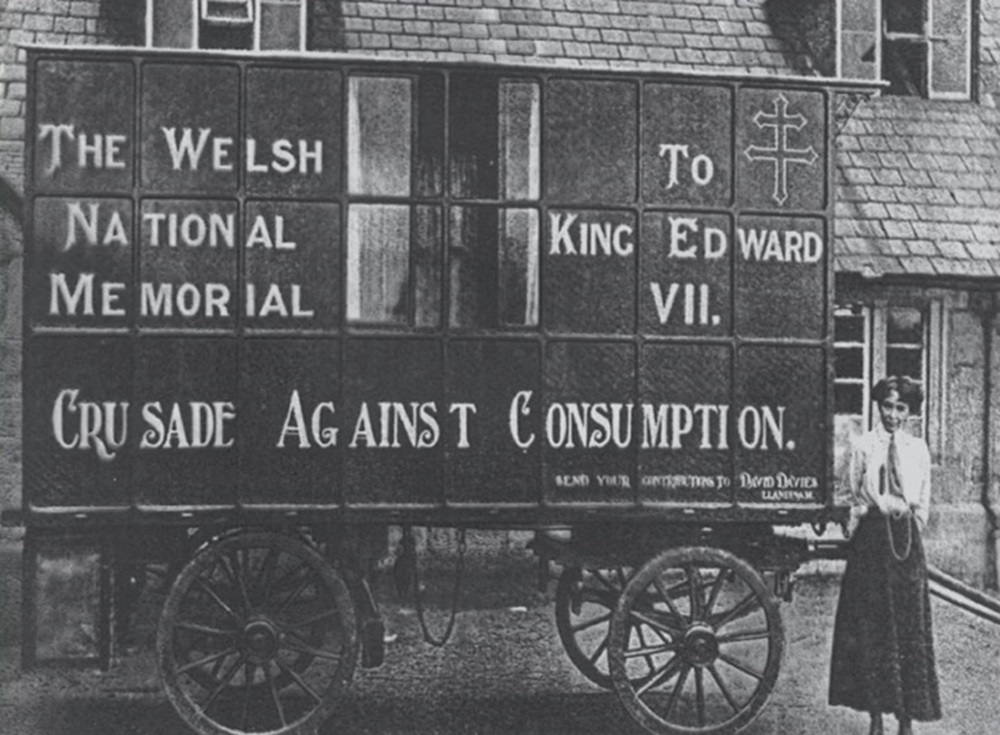How the NHS was founded in Wales in 1910 – not 1948

Martin Shipton
The 76th birthday of the NHS has been marked by a call to establish a new history website that gives credit to those who pioneered a pilot national health service 38 years before the full body was established.
The call comes from Aneira Thomas, the first baby to be born on the NHS, and Emma Snow, author of a new book outlining how a National Health Service began in Wales before the Second World War, well before Aneurin Bevan made it a UK-wide institution in 1948.
In her book The First NHS, Ms Snow describes how Wales had a national health service 38 years before England – the Welsh National Memorial Association (WNMA), headquartered at the Temple of Peace and Health in Cardiff.
She tells how the full NHS put in place by Nye Bevan copied the model set up in Wales early in the 20th century, largely through the efforts of a Montgomeryshire friendly society leader, her great-grandfather John Tomley.
Ms Snow argues that NHS history in Wales is still not on the compulsory Curriculum for Wales and does not yet appear in any Welsh school history textbooks.
While the new history textbook for 11-14 year olds mentions health, it does not even mention Nye Bevan or the Crimean War nurse Betsi Cadwaladr, both of whom who have NHS health boards named after them, let alone other people and organisations involved, such as the WNMA founders.
Hidden health heroes
She says more research is needed to uncover these hidden health heroes and include them on the curriculum for all children and young people in Wales. Both Emma Snow and Aneira Thomas have written about the history of the NHS in Wales.
Julie Morgan, MS for Cardiff North and former Deputy Minister for Social Services, met the two women at the Temple of Peace and Health.
She said: “Here in Wales, we are all very proud of our Welsh connection to the NHS, with Nye Bevan setting it up in 1948. It is fascinating to find out the full story of how Wales played even more of a role in setting up the NHS than we thought.

“It is vital that children and young people in schools, as well as health and social care patients and staff, can find out about all our Welsh NHS health heroes and celebrate them.
I fully support the call for a new NHS Wales history website, for Welsh NHS history to be added to the Curriculum for Wales and textbooks, and for more research into Welsh health history.
“As a start, Aneira and Emma’s books should be stocked in all Welsh secondary school libraries.”
Welsh National Memorial Association
In a blog posting, Ms Snow wrote: “The first ever national health service pilot in the UK was set up in 1910, covering tuberculosis (TB) services in Wales. It was set up by a group led by three Welsh men: health commissioner John Tomley,, leading doctor David Rocyn-Jones, and MP and philanthropist David Davies.
“They named the organisation the Welsh National Memorial Association. Over the years, thousands of staff and tens of thousands of patients passed through its doors.
“The second national health service pilot was set up during the First World War, when hospitals, which had previously been independent, had to work together to cope with the number of casualties from the war. John Tomley became chair of the North Wales hospitals area, which then covered the top half of Wales. After the war, everyone hoped that a full national health service would be set up in the UK, following the example of the WNMA. However, austerity was introduced by the government instead, so it was not to be.
“During the 1920s and 30s, the TB rate in Wales improved, but not as fast as England. This was surprising as the TB health services were much better in Wales because of the WNMA, which England didn’t have. John Tomley started to work with the WNMA doctors and collate TB statistics to find out the root causes. By the late 1930s, John became the UK leader of the friendly societies who provided nearly all healthcare for workers in those days, so equivalent to the chief executive of the NHS today. He led the campaign for the government to hold a full inquiry, supported by his local MP Clem Davies.
“Eventually their campaign was successful and the Welsh TB Inquiry began, led by Clem and a senior doctor. With the help of John’s TB statistics map, and interviewing people across Wales, they discovered what are today called the social determinants of health, which have even more effect on people’s health than health services. Wales was particularly hard hit by high unemployment. There was no social housing, so people were forced to pay high rents to private landlords for poor quality housing with bad sanitation. Education was also poor, with schools lacking transport, sanitation, heating and hot food for children. This all added up to higher rates of disease than England.
“The Welsh TB Inquiry caused an outcry across the UK in the national press and uproar in Parliament when the final report was released in 1939. Yet the work had to be put on hold as the Second World War broke out.
“By 1941, William Beveridge had been commissioned to write a report on what should happen with post war reconstruction. Although no-one from the Welsh TB Inquiry had been appointed by the government to his official group, he knew Clem well, and therefore spent a year working with him behind the scenes. Clem therefore contributed a lot of the evidence and outcomes from the Welsh TB Inquiry, and this formed the basis of the Beveridge Report’s Five Giants, the social determinants of health, which the NHS and welfare state would be set up to fight against.
“The third national health service pilot was set up during the Second World War, when hospitals and other medical services were taken over again and worked together for the war effort.
“Finally, after this war, the people voted for a national health service and the welfare state in 1945, and Nye Bevan was chosen to make our NHS a reality. After much work, he set up the full NHS in 1948. The WNMA became the transitional authority for Wales, so effectively it turned into NHS Wales. The first NHS Wales headquarters remained at the WNMA headquarters of the Temple of Peace and Health in Cardiff.”
Emma Snow is chief executive of health and social care charity Community Opportunity, works in change management for an NHS acute trust, and is an independent member of Oxfam GB’s Audit & Risk Committee.
Find out more about Emma Snow’s book, The First NHS here.
Support our Nation today
For the price of a cup of coffee a month you can help us create an independent, not-for-profit, national news service for the people of Wales, by the people of Wales.







My own family history in fact my being able to comment on this article is tied to this.
My father contracted TB in colliery in Rhondda in WW2 as a 14 yo.
He spent years in Talgarth and Sully, having had a whole lung removed to eradicate his TB.
He went back to work not in colliery but in industry until he retired, passed away at 86.
I was born in 1950’s and would not be here except for those services mentioned.
The South Wales miners Federation forerunner had their own Small hospitals and G P,s paid for off their dockets a couple of Pennies a week it was voluntary for the whole family and a pension scheme of a sort also voluntary which was before the welfare state they where ahead of their time
Voluntary hospitals throughout the UK were supported by such subscriptions. Many General Practitioners in the late 19th & early 20th Century operated ‘Club Practices’ where workers paid a subscription, rather than pay for treatment. Many union and mutual schemes became National Health Insurance Scheme (NHIS) contractors as did the GPs who had operated the club practice model. NHIS established under Lloyd George’s 1911 National Insurance Act. By 1948 80% of GPs in Great Britain were NHIS contractors.
Interesting article, but it would have been nice to have had a link included about where to purchase Emma Snow’s book: https://www.pen-and-sword.co.uk/The-First-NHS-Hardback/p/23925
Excellent point – will add in now. Diolch
Are we the only country in the world who ignore our achievements, fail to teach them in schools, as part of the curriculum, but fully embrace and teach the history of a neighbouring country?. Mrs Gareth was educated through the medium of English, can tell me about the kings and queens of England, the magna carta etc, but did not know who Hywel Dda was, it’s about time it changed.The above and the Aberfan disaster alone, should be known to every man woman and child in our country.
Well why would they, if you call yourself Welsh then you have already accepted the terms of such things. All our ancient history that was written down as Britons will be lost, or worse still, attributed to that foreign nation.
“She tells how the full NHS put in place by Nye Bevan copied the model set up in Wales early in the 20th century” Bevan merely implemented (in England and Wales) the policies that had been put together by Minister of Health Ernest Brown, LibNat, (replaced in Nov 1943 by Henry Willink, Con), & Scottish Secretary Tom Johnston, Lab, and published in a Coalition government white paper March 1944. “After the war, everyone hoped that a full national health service would be set up in the UK” It was not until the late 1920s that the Socialist Medical Association started… Read more »
Hi Bill Yes I found a lot of the history very surprising myself, as the author. Ernest Brown’s policies came from his LibNat colleague Clem Davies MP who had led the Welsh TB Inquiry and then worked on the Beveridge Report. I believe Clem’s involvement was little known until his grandson wrote about it in recent years, so I have not found it mentioned in any mainstream history books. My NHS colleague who is interested in history told me that the Welsh TB Inquiry led to the Beveridge Report, yet he couldn’t remember where he read it. So that is… Read more »
“Ernest Brown’s policies came from his LibNat colleague Clem Davies MP” No, Ernest Brown had responsibility for health in Scotland when he was Scottish Secretary. The NHS was the next logical step after (inter alia) Lloyd George’s National Insurance Act 1911 established the National Health Insurance Scheme (NHIS), the Highlands and Islands Medical Service (HIMS) established because crofters were not eligible for the NHIS, Neville Chamberlain’s Local Government Act 1929 that transferred ‘Poor Law’ hospitals to County Councils, and Kingsley Wood’s Midwives Act 1936 that led to a dramatic drop in infant and maternal mortality. ~~~ “the Welsh TB Inquiry… Read more »
Hi Bill Thank you so much for your reply. If you read the book you will be able to see the new research I have done which adds to this, in particular that Clem Davies MP did a lot of work with William Beveridge behind the scenes, inputting the information from the Welsh TB Inquiry so it could be considered in the Beveridge Report (not just an NHS but all the wider welfare state requirements such as social housing). Of course other areas across England and Scotland were considered too, yet they are relatively well covered in the history books,… Read more »